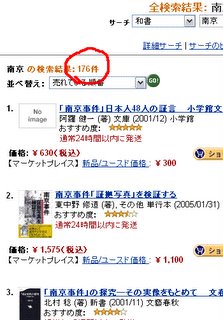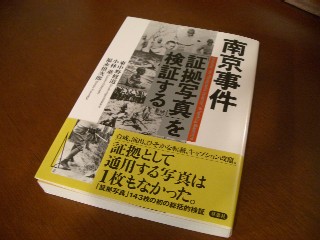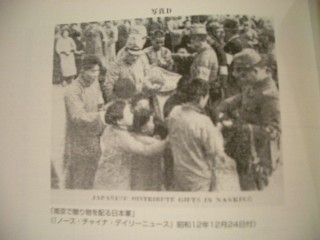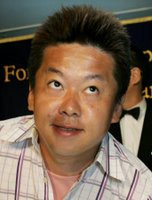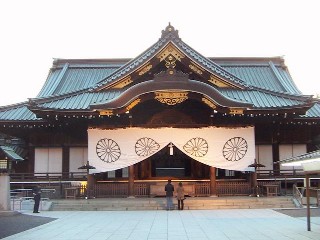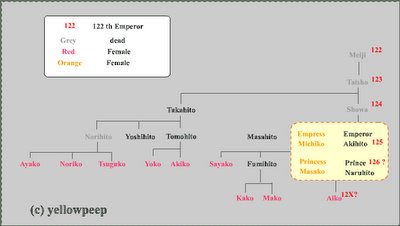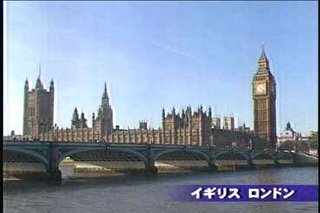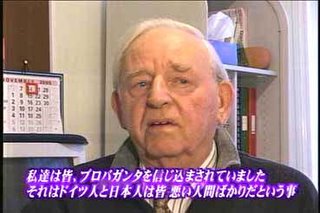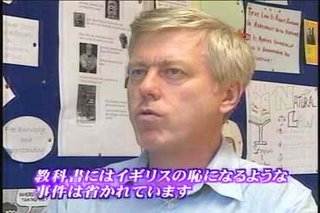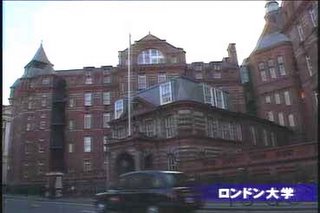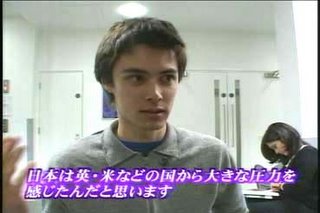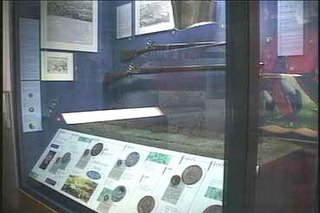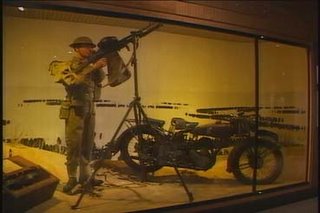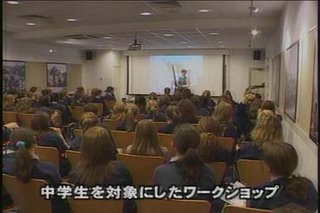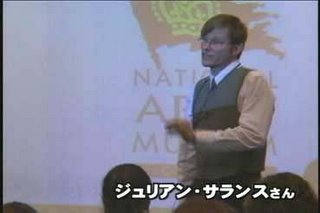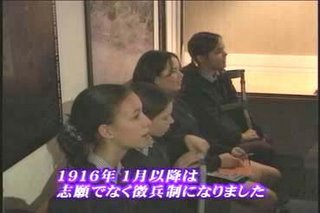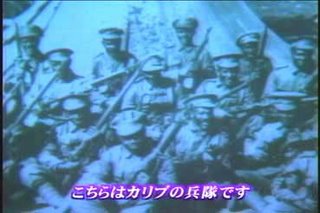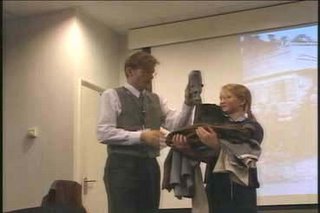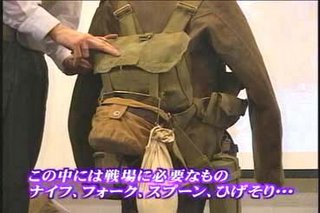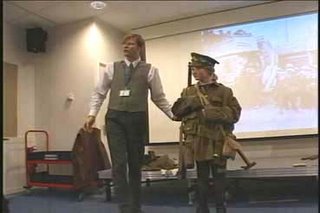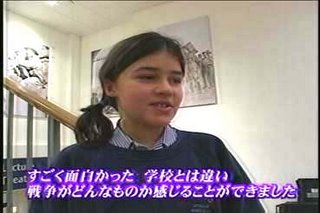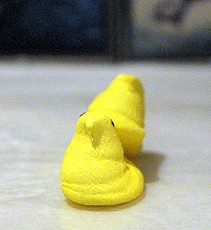This series is from a local TV program in Japan to get closer to the real facts of WWII. For more detail, go to the prologue.http://yellowpeep.blogspot.com/2005/12/what-japan-did-in-wwii-malaysia.htmlYou may think that it is one-sided history from Japanese perspective. So did I. But actually I've never been taught in school about the fact the TV says. And suddenly I realized that I am the one who only knew the other one-sided history. Let me know how you felt. The staff flew to Korea.Narator: This year (2005) was a friendship year of Japan and Korea. But the relation got less and less passionate ever.
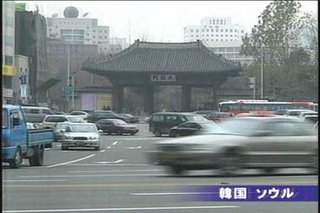 Narator: The first place we visited is the war museum in Seoul. It mainly exhibits Korean war occured in 1950. It also has a section of Japanese rule in WWII.
Narator: The first place we visited is the war museum in Seoul. It mainly exhibits Korean war occured in 1950. It also has a section of Japanese rule in WWII.
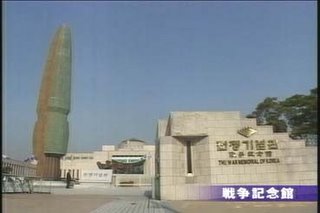 Narator: We asked children at the exit what is their impression on Japan.
Narator: We asked children at the exit what is their impression on Japan.
Girl A : Japan is a bad country that deprived us of Korea.
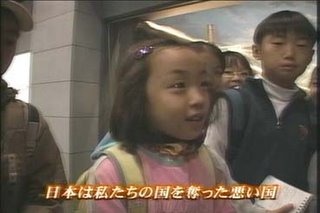 Boy : They invaded us twice. The first one is Hideyoshi, and the second was in the 20th century. ( Hideyoshi Toyotomi was a Japanese general who unified Japan in 16c.)
Boy : They invaded us twice. The first one is Hideyoshi, and the second was in the 20th century. ( Hideyoshi Toyotomi was a Japanese general who unified Japan in 16c.)
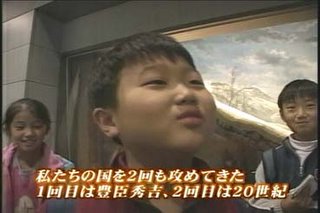 Girl B : I think Japan is a bad country since Hideyoshi invaded Korea and killed people.
Girl B : I think Japan is a bad country since Hideyoshi invaded Korea and killed people.
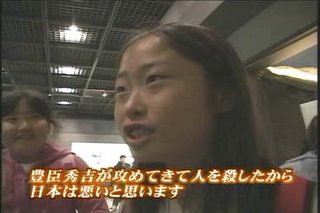 Narator: We visited an office in Yeouido, Seoul. There is a grop consisting of 2000 members of history teachers. The cover mainly studying and writing of history textbooks. We talked to the president of the group, Kim.
Narator: We visited an office in Yeouido, Seoul. There is a grop consisting of 2000 members of history teachers. The cover mainly studying and writing of history textbooks. We talked to the president of the group, Kim.
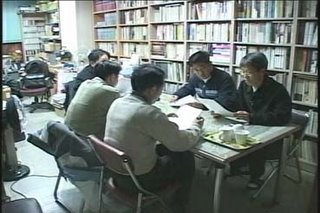 Teacher Kim : The entire Korea has been discussing how we should face the colonial rule. Some claim that the colonial rule allowed Korea to develop because many novel things were introduced. However, this perspective brings a dispute because the fact was not for Korea but Japan, in other words, they did it for easier rule for Japan, not allowing the nation "Korea" to develop.
Teacher Kim : The entire Korea has been discussing how we should face the colonial rule. Some claim that the colonial rule allowed Korea to develop because many novel things were introduced. However, this perspective brings a dispute because the fact was not for Korea but Japan, in other words, they did it for easier rule for Japan, not allowing the nation "Korea" to develop.
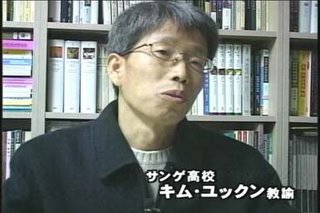 Narator : We opened the only Korean history textbook published by Korean government. It writes in page 163 that the most shameful deed Japan did in its colonial time was using women for their war. It also writes some of the women were even used as comfort women for Japanese soldiers.
Narator : We opened the only Korean history textbook published by Korean government. It writes in page 163 that the most shameful deed Japan did in its colonial time was using women for their war. It also writes some of the women were even used as comfort women for Japanese soldiers.
 Narator: We came to Central High School in Seoul. It's a boy's school.
Narator: We came to Central High School in Seoul. It's a boy's school.
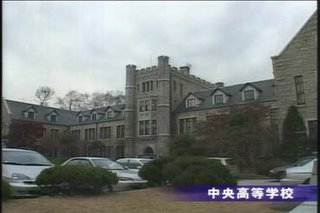 Narator : We got a permission to the TV coverage in teacher Choi's classroom.
Narator : We got a permission to the TV coverage in teacher Choi's classroom.
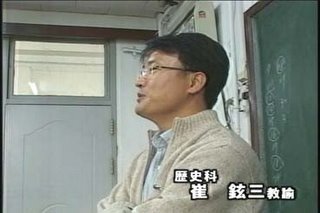 Teacher Choi : The most interesting movie I watched about Japan was "Hotaru no Haka (grave of the fireflies)." Does anybody know about it? (A brother and sister die of hunger in WWII in this movie.)
Teacher Choi : The most interesting movie I watched about Japan was "Hotaru no Haka (grave of the fireflies)." Does anybody know about it? (A brother and sister die of hunger in WWII in this movie.)
Narator : A few raised their hands.
Teacher Choi : What did you think after watching it? What I noticed was that the Japanese people were also victims of WWII. Before this movie, I never thought that Japanese was also the victim of imperialism. Now I reached my conclusion. We have to separate Japan into two: to be blamed are the military, government, and companies. And Japanese people are on our side, victims. It's jumping conclusion to say that the entire Japan functioned as a whole to make a profit.
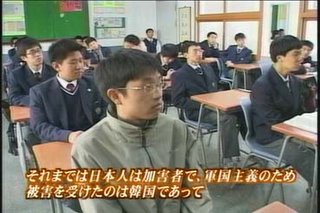
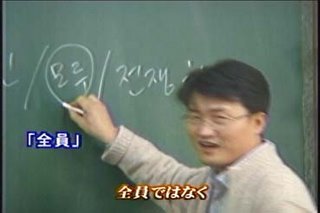 Teacher Choi: (After class he's talking to interviewer.) What I talked about is not described in our history textbook. Especially It completely omits descriptions about the circumstances around Japanese people, what kind of life they were leading inside Japan. Although it's of importance to stick to history textbook, I think it's more important for each teacher to construct a firm way of thinking.
Teacher Choi: (After class he's talking to interviewer.) What I talked about is not described in our history textbook. Especially It completely omits descriptions about the circumstances around Japanese people, what kind of life they were leading inside Japan. Although it's of importance to stick to history textbook, I think it's more important for each teacher to construct a firm way of thinking.
Narator : Speaking of history textbook, China and Korea strongly have been protesting against the use of a textbook, Fusosha's textbook. We gathered information at an organization, "Fair collection of Japanese history textbook" in Seoul. Researchers from high schools and universities comprise this organization, studying the controversial textbook.
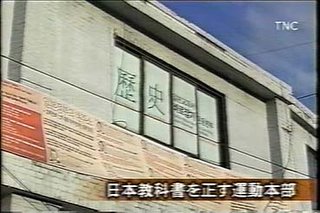 Narator : We asked the teachers sitting at the desk what's wrong with the textbook.
Narator : We asked the teachers sitting at the desk what's wrong with the textbook.
 Doctor of history, Shin: In order to justify Japanese invasion into Korea, it uses the phrase that says Japan modernized Korea.
Doctor of history, Shin: In order to justify Japanese invasion into Korea, it uses the phrase that says Japan modernized Korea.
Narator : Researcher Choi picked up a discription on Rosso-Japanese war. It uses the statement from Sun Wen (Chinese leader) said, "As a result of Japanese win over Russia, the whole races in Asia came to bear a hope for independence."
History teacher Choi : The expression "Great East Asian war"and the part with the necessity of WWII to give independences to Asian countries are what I doubht the most.
Doctor of History, Shin: The problem is that it emphasizes the damage of Japan suffered from WWII. It plots the Japan as a sufferer rather than a perpetrator. It also looks Korean or Taiwanese who fought together with Japan in the same way it looks Japanese people.
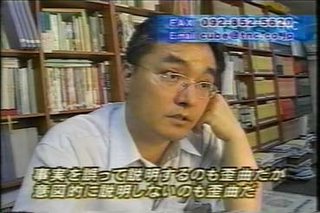 Narator : We managed to meet elder people who remember the colonial period in Korean peninsula. Here we are in a meeting place for elderly people. Jo Imho(87) was married to a peasant.
Narator : We managed to meet elder people who remember the colonial period in Korean peninsula. Here we are in a meeting place for elderly people. Jo Imho(87) was married to a peasant.
Jo : As a farm family and a daughter of a senior official, I didn't work and all the things were taken care of by my housekeeper.
Staff : Any problem or inconvinience because of living in colony?
Jo : Not at all.
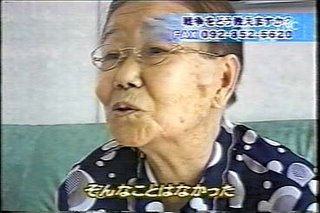 Narator : Moon Jong (79) was a student in a domitory next to school.
Narator : Moon Jong (79) was a student in a domitory next to school.
Moon: At that time Japanese neglected Korean. I was so frustrated with the lack of Korea.
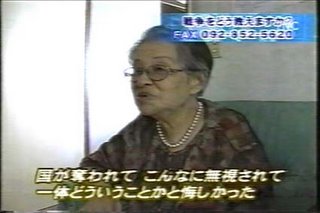 Narator : Li Sang Man (90) was a firefighter. He didn't want to get drafted and passed an exam to be firefighter.
Narator : Li Sang Man (90) was a firefighter. He didn't want to get drafted and passed an exam to be firefighter.
Li : I never imagined that Japan would be defeated. I was so staggered that I couldn't think of what would happen next. Never did I think that Japan would lose. (He is speaking Japanese.)
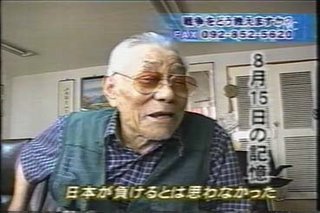 Narator : A book written by a Korean became a best seller in Japan, selling 300,000 copies since 2002. The auther Kim Wan Sop completely changed his way of thinking about Japan in favor of Japan as he spent years overseas. (The camera focuses on his messageboard online, full of Korean comments, "Kill you" or "We should kill Chinilpa" (chinilpa is a derogatory term standing for those who likes Japan.) ) He claims that Korean should be blamed for every issue such as history, Yasukuni, or Takeshima. The book he wrote was pointed as a harmful book by Seoul and banned. His concept is "the one who twists the interpretation of the history is Korea, not Japan. And this is the standard observation from the world."
Narator : A book written by a Korean became a best seller in Japan, selling 300,000 copies since 2002. The auther Kim Wan Sop completely changed his way of thinking about Japan in favor of Japan as he spent years overseas. (The camera focuses on his messageboard online, full of Korean comments, "Kill you" or "We should kill Chinilpa" (chinilpa is a derogatory term standing for those who likes Japan.) ) He claims that Korean should be blamed for every issue such as history, Yasukuni, or Takeshima. The book he wrote was pointed as a harmful book by Seoul and banned. His concept is "the one who twists the interpretation of the history is Korea, not Japan. And this is the standard observation from the world."
 Kim : The education in Korea is completely wrong. On the other hand, Japanese history textbooks write few about Korean developments or modernization even though Korean peninsula used to be a part of Japan.
Kim : The education in Korea is completely wrong. On the other hand, Japanese history textbooks write few about Korean developments or modernization even though Korean peninsula used to be a part of Japan.
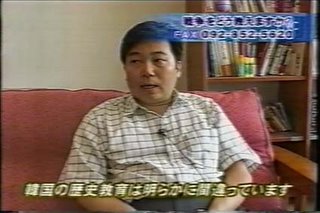 Narator : Kim also says that many things appearing "History newspaper" used as a sidereader in Korea contains a lot of mistakes. He points out the population of Korea in 1910 didn't reach 10 milions while the side reader uses the headline with "20 millions".
Narator : Kim also says that many things appearing "History newspaper" used as a sidereader in Korea contains a lot of mistakes. He points out the population of Korea in 1910 didn't reach 10 milions while the side reader uses the headline with "20 millions".
Kim : Japanese lost a lot of lifes in WWII and fed up with wars. The policies of GHQ by America made the Japanese pacifist. Japan used to have many good things in its old time, but they regret all their history as if they brought about a huge invasion into the world. I think it's too much, and the tendency should be relaxed.
Narator : Jo Giyon (78) was a student when the war ended.
Jo : I couldn't receive Korean education, all I got was a Japanese education. I respected teachers. And the society was making an effort to achieve the equality between Korean and Japanese. (My comment: From 1942, Japanese government became less enthusiastic to teach Korean as before. Tokyo thought that adaptation to Japan is the closest way to decrease discrimination. The more Korean learn Japanese, the more they can get easily used to the society of Japan mainland. However, this policy is now a target of dispute by some people as a policy erasing Korean culture.)
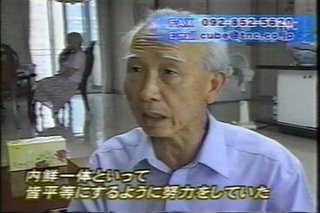 Narator : Jun Tae Hi is a Korean born in Dalian (North china). She moved to Beijing for her job. She was teaching excersize to Japanese men.
Narator : Jun Tae Hi is a Korean born in Dalian (North china). She moved to Beijing for her job. She was teaching excersize to Japanese men.
Jun : The people in China were generally living as they were without much discrimination. In fact, I meet with respectable teachers as well, so I didn't suffer from a discrimination in my school, either.
Jun : When I heard the radio announce the surrender of Japan Aug. 15, I couldn't hear much. But the girls around me began to sob. Everyone. I felt an awkward feeling. We must have a feeling of liberation, but I was young, didn't understand what it was. So awkward that I didn't know if I should cry or not. (speaking in Japanese.)

Jun : We lost to Japan and it's a shame. However, we must teach the history as it is to children. (speaking in Japanese)
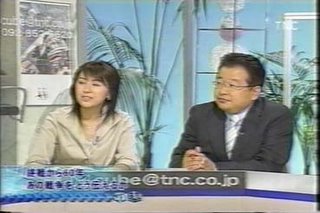 Announcers: We've got lots of comments in our website during the series of this program. Let me introduce some them here today.
Announcers: We've got lots of comments in our website during the series of this program. Let me introduce some them here today.
Comment 1 : I think we ought to teach the significance Japan had, the war to protect our country. Don't be deluded by China or Korea into the masochistic perspective.
Comment 2: We can't help equalize the feeling of the one who stepped someone's toe and the one who was stepped. We may as well think of those who were stepped. History is important, but the heart to think about someone else is more important.
Comment 3 : I'd like to ask a portion of people in east Asia. What do you think we can do to forgive Japan? Japan has been searching for the way for 60 years and entered into 21st century without knowing it. I think it's time to tell me how.
Comment 4 : I don't know what is the truth, but the education to let people hate other people is absolutely wrong. What's the most important is to educate friendly emotion in children's heart.
Comment 5 : Don't glorify the crime Japan did. Regard the mistake as it is, and apologize to Asian countries. Let people remember wars, and we can do it by teaching the fact that killing each other creates nothing, leaving only grief or resentment. I think the start point is to think about people nearest to you.

***********************************************************
You may want to know about Japanese military in other countries:
What Japan did in WWII - Malaysia (prologue) What Japan did in WWII - UKWhat Japan did in WWII - MyanmarWhat Japan did in WWII - IndonesiaWhat Japan did in WWII - TaiwanWhat Japan did in WWII - Palau What Japan did in WWII - KoreaWhat Japan did in WWII - (epilogue)
